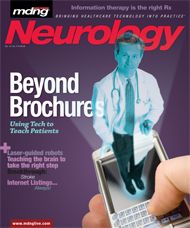Publication
Article
MDNG Neurology
Already in progress
We have been publishing MDNG for a decade now, and healthcare technology has changed in so many ways in those years.
We have been publishing MDNG for a decade now, and healthcare technology has changed in so many ways in those years. In the early days, our goal was to be a kind of “TV Guide to the Internet” for physicians, many of whom were just becoming aware of the resources and information available online. We catalogued the best websites for physicians and patients, interviewed the visionaries who were imagining new and exciting ways that the connective powers of the Internet could be applied to healthcare, and profiled other information technologies. As the Internet and health IT became more sophisticated, so too did our readers, incorporating these tools into daily practice. As readers’ information needs and professional interests evolved over the years, MDNG kept pace, expanding our Internet-centric coverage to include now-indispensible gadgets such as PDAs and smartphones, EHRs, e-prescribing, and other applications. Change is in the air once again. From pending healthcare reform on an as-yet-unknown scale to the explosion of “Health 2.0” and social media technologies, the healthcare landscape is in flux, and MDNG is adapting with the times. In this issue, you will notice several changes in both form and content. We’ve freshened up the look and style of our layouts and incorporated new graphical elements and flourishes. I think you’ll agree that our designers have really outdone themselves. Taking cues from some of our favorite design and technology journals, we’re going to explore how graphic design can not just complement text, but reinforce and transform it.
We’ve done more than just change our style sheets—we have also reimagined the editorial content in MDNG. The most noticeable change is that we’ve improved our famous Net Guide section. Previously, it was organized according to resource type—online CME programs, patient education resources, clinical trial listings, medical websites designed specifically for physicians, abstracts of studies published online, etc. Although such an arrangement has its uses, it doesn’t match with how most clinicians search for and interact with the information they find online. Narrowly focused search is the name of the game nowadays, and our redesigned Net Guides reflect that. Now, readers will find specialty-specific clinical information, tools, and other resources organized by disease and condition. Each Net Guide section is further organized by resource type (the familiar categories I previously mentioned), allowing readers to access disease-specific information in a variety of formats. As part of this redesign, we have also refreshed the front-of-book section formerly known as “The Pulse,” rechristening it as “The Check Up” and devoting that space to profiling useful technology applications and other tools and online resources for physicians.
Our feature articles and cover stories will put less emphasis on comprehensive, full-featured EHRs, and instead pay more attention to Health 2.0/Web 2.0 collaborative technologies, the applications that David Kibbe and others refer to as “clinical groupware,” and other technologies and tools that have unexpected relevance and utility for practicing physicians. We will explore the use of social media applications and other online resources to promote physician—physician and physician–patient communication and collaboration, and the ways in which new technology tools and gadgets can be adapted to help physicians improve productivity and efficiency in their professional and personal lives, deliver better care, and just get more done. Finally, MDNG will also leverage the power of the HCPLive network, connecting to our dynamic online portal and incorporating feedback and commentary on the content in MDNG from our growing community of engaged online physician readers. We will create a self-sustaining and ongoing dialogue that enables us to tap into the collective intelligence of our readers, using that insight to inform and shape the content in MDNG, creating a seamless publishing environment that provides cutting-edge content that helps readers stay abreast of the news and issues that matter most to them. It promises to be a fascinating journey, and we’re glad you’re coming along for the ride.
Thank you for reading,
Mike Hennessy






